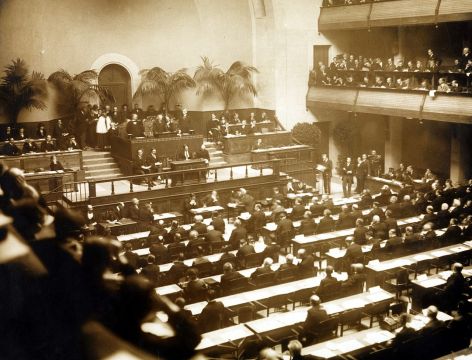Can the United Nations Be Reformed?
Has the United Nations failed to meet its original purpose? Some believe so and are calling for reform. But can the United Nations be reformed?

Many believe the United Nations has fallen far short of its original goal of maintaining world peace. Various voices are calling for the institution to be reformed. One person calling for reform is Pope Francis. He has called for concrete changes to be made for the UN to become a “family of nations” instead of a forum for great powers to compete.
But we must ask the question, Can the United Nations be effectively reformed?
The failure of the League of Nations
The predecessor of the UN was the League of Nations, founded in 1920.
After World War I—the most horrific war in history at that time—the nations agreed that it must be the war to end all wars. Many saw the rival alliances between nations as a main cause for the bloody conflict. The war was shocking in its brutality and misery.
The first meeting of the League of Nations Assembly on Nov. 15, 1920 (National Library of Norway). 
So, the League of Nations was the first intergovernmental organization set up to try to maintain peace. Its goal was “to promote international cooperation and to achieve peace and security.” The idea was to resolve disputes before they escalated into armed conflict.
But the League of Nations failed miserably. Some of the problems that led to its failure were that it did not include all nations (notably missing: the United States), it had no armed forces to enforce its resolutions, it met aggression with unrealistic calls for pacifism and it could only act with unanimity among its members, among many other issues.
As a result of such systemic problems, the League of Nations failed to prevent the Second World War. To learn more about why it failed, read “100 Years Since the Treaty of Versailles.”
After World War II, it was replaced with the United Nations with a similar goal of preventing war and maintaining peace.
Has the UN been effective?
How has the United Nations fared since its inception?
The United Nations charter is based on maintaining global peace, upholding human rights and protecting the vulnerable by supplying humanitarian aid when needed. The UN, through its world food programs and global initiatives, has helped relieve some poverty and despair.
But it hasn’t fared well in preventing atrocities or wars.
Some of the atrocities that have occurred under its watch include:
- The deaths of 2 million people by the Khmer Rouge between 1975-1979.
- The 1994 Rwandan genocide that killed over 1 million people despite having a UN peacekeeping presence on the ground.
- The Kashmir dispute between India and Pakistan.
- The ongoing Israeli-Palestinian conflicts.
- The ongoing Somali civil war.
- The Darfur conflict in Sudan.
The list could go on and on. In fact, it’s hard to see a war or genocide that the UN has successfully prevented since its inception.
In a recent address, Ukrainian President Zelensky highlighted the UN’s utter inability to do anything constructive to help Ukraine. He said, “Where is the security that the Security Council is supposed to guarantee?” Despite Russian atrocities and a UN resolution condemning Russian aggression, Russia remains on the UN Security Council.
On that point, we should also note that China retains its seat on the Security Council despite its inhumane and brutal treatment of the Uighur people within its own border.
The problem of self-interest
International organizations, like the UN, have no power except what is given to them by their member states, so they must work to try to convince nations to submit their national self-interests to the interests of the global community. But it has been shown, over and over again, that nations will usually seek self-interest over all else. It is a basic element of human nature that extends all the way down to children in school.
This has been very obvious during the recent Russia-Ukraine war, where various nations’ self-interests have prevented them from fully condemning obvious Russian aggression. Especially in times of crisis, self-interest tends to trump values and principles.
Some suggest that the UN can be reformed to be more effective. Can reforms fix the United Nations?
What really needs to be reformed?
Certainly, nearly everything in our world needs reform. But reform plans are often limited to structure, processes and procedures, and spreading power.
Even though some reforms could have a limited positive impact, something bigger is needed. To understand what that is, consider what the Bible shows is most important.
God has worked through, and allowed, many human structures throughout history.
Yet, despite allowing various structures and methods to be used, there is a universal truth we must understand: The Bible shows success, peace and happiness come only through personal character.
Consider the following examples:
- Noah was a “preacher of righteousness” among the “world of the ungodly” (2 Peter 2:5).
- Abraham was also known for his righteousness and was called “the friend of God” (James 2:23). God said, “Abraham obeyed My voice and kept My charge, My commandments, My statutes, and My laws” (Genesis 26:5).
- Moses’ father-in-law advised him to appoint leaders who were “able men, such as fear God, men of truth, hating covetousness” (Exodus 18:21).
- God expects the judges over the people to be “wise” and “knowledgeable,” to “judge righteously” and to “not show partiality in judgment” (Deuteronomy 1:13-17; 16:18-19).
- When God set up a king, He looked for “a man after His own heart” (1 Samuel 13:14; 16:7) who would perform all His will (Acts 13:22; 1 Kings 15:5).
- Those who wish to follow God are to flee from the “love of money” and pursue “righteousness, godliness, faith, love, patience, gentleness” (1 Timothy 6:10-11).
What’s the common factor in the above examples? They all describe character attributes and obedience to God. This highlights the problem with the United Nations and all governments of our world—they all operate independently of God and leave righteous character out of the picture.
Only God can bring real peace
The perfect organizational structure with excellent procedures and processes will still not bring peace if God isn’t involved.
The Bible says, “Unless the LORD builds the house, they labor in vain who build it” (Psalm 127:1). Unless God is involved, all attempts to achieve peace will fail (Isaiah 59:8). Sadly, the UN can’t enact reforms that would lead it to be an effective force for world peace.
But individuals, including you, can bring peace on a small level by including God in their lives. They can implant His commandments and principles into their lives—which will lead to greater peace within their small sphere of influence.
Speaking of Christ’s future rule, Isaiah wrote, “Of the increase of His government and peace there will be no end” (Isaiah 9:7).
The path to peace is not reforming the UN, but praying fervently, “Your kingdom come” (Matthew 6:10)!
Photo credit:
Yann Vernerie/iStock via Getty Images
Date Posted: May 24, 2022



